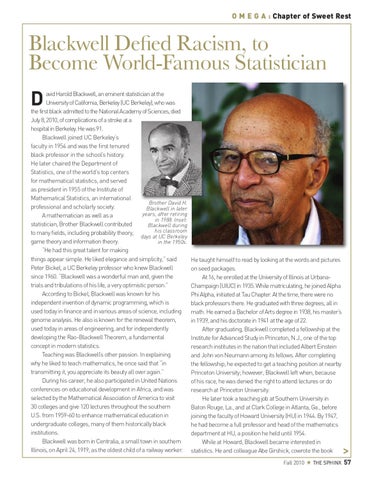O M E G A : Chapter of Sweet Rest
Blackwell Defied Racism, to Become World-Famous Statistician D
avid Harold Blackwell, an eminent statistician at the University of California, Berkeley (UC Berkeley), who was the first black admitted to the National Academy of Sciences, died July 8, 2010, of complications of a stroke at a hospital in Berkeley. He was 91. Blackwell joined UC Berkeley’s faculty in 1954 and was the first tenured black professor in the school’s history. He later chaired the Department of Statistics, one of the world’s top centers for mathematical statistics, and served as president in 1955 of the Institute of Mathematical Statistics, an international Brother David H. professional and scholarly society. Blackwell in later years, after retiring A mathematician as well as a in 1988. Inset: statistician, Brother Blackwell contributed Blackwell during his classroom to many fields, including probability theory, days at UC Berkeley game theory and information theory. in the 1950s. “He had this great talent for making things appear simple. He liked elegance and simplicity,” said Peter Bickel, a UC Berkeley professor who knew Blackwell since 1960. “Blackwell was a wonderful man and, given the trials and tribulations of his life, a very optimistic person.” According to Bickel, Blackwell was known for his independent invention of dynamic programming, which is used today in finance and in various areas of science, including genome analysis. He also is known for the renewal theorem, used today in areas of engineering, and for independently developing the Rao-Blackwell Theorem, a fundamental concept in modern statistics. Teaching was Blackwell’s other passion. In explaining why he liked to teach mathematics, he once said that “in transmitting it, you appreciate its beauty all over again.” During his career, he also participated in United Nations conferences on educational development in Africa, and was selected by the Mathematical Association of America to visit 30 colleges and give 120 lectures throughout the southern U.S. from 1959-60 to enhance mathematical education in undergraduate colleges, many of them historically black institutions. Blackwell was born in Centralia, a small town in southern Illinois, on April 24, 1919, as the oldest child of a railway worker.
He taught himself to read by looking at the words and pictures on seed packages. At 16, he enrolled at the University of Illinois at UrbanaChampaign (UIUC) in 1935. While matriculating, he joined Alpha Phi Alpha, initiated at Tau Chapter. At the time, there were no black professors there. He graduated with three degrees, all in math. He earned a Bachelor of Arts degree in 1938, his master’s in 1939, and his doctorate in 1941 at the age of 22. After graduating, Blackwell completed a fellowship at the Institute for Advanced Study in Princeton, N.J., one of the top research institutes in the nation that included Albert Einstein and John von Neumann among its fellows. After completing the fellowship, he expected to get a teaching position at nearby Princeton University; however, Blackwell left when, because of his race, he was denied the right to attend lectures or do research at Princeton University. He later took a teaching job at Southern University in Baton Rouge, La., and at Clark College in Atlanta, Ga., before joining the faculty of Howard University (HU) in 1944. By 1947, he had become a full professor and head of the mathematics department at HU, a position he held until 1954. While at Howard, Blackwell became interested in statistics. He and colleague Abe Girshick, cowrote the book Fall 2010 H THE SPHINX
> 57
